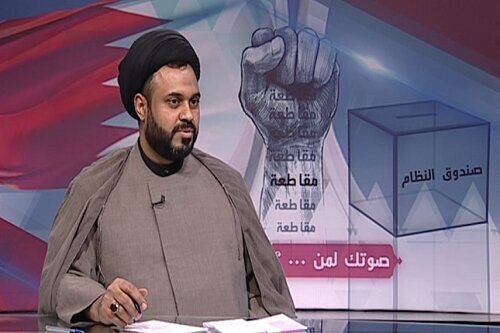Hawzah News Agency- for more than ten years, the people of Bahrain have continued a peaceful revolution to realize freedom and democracy in their country. Supporting the Palestinian cause has always been a significant part of the demands of the Bahraini revolutionaries. However, the Al-Khalifa regime has directed its relations with the Zionist regime towards normalization at the same time as it severely suppresses the Bahraini opposition.
With the beginning of the Al-Aqsa storm operation, the people of Bahrain held rallies in defense of the people of Gaza in the shadow of severe repression by Al-Khalifa mercenaries, but the Al-Khalifa regime, ignoring the request of the Bahraini people, participated in the American and British anti-Yemen coalition, and the fifth fleet of the US Navy, which is based in Bahrain came to the aid of the American and Zionist axis.”
In this regard, the correspondent of Hawzah News has discussed Bahrain's participation in the US-UK military alliance and its political and legal effects with Hujjat al-Islam Seyyed Abbas Shabar, the director of the religious freedoms department at the Bahrain Peace Organization for Human Rights.
The text of the interview is as follows:
Hawzah News: How do you evaluate the joining of the Bahraini government to the American and British coalition against Yemen?
In my opinion, the participation of the Bahraini regime in this coalition shows the political isolation and human rights tensions of this regime. As its role in strengthening the hostile dimensions of the Zionist project in the region is also evident. In fact, the Bahraini regime is separated from the Arab and Islamic nations and is isolated in a way, therefore, to compensate for it, it has participated in the aggressive British and American coalition against Yemen.
This participation reflects a hostile approach that transcends geographical boundaries and affirms the continuation of colonial rule, and on the other hand reinforces the urgent need to end the presence of foreigners in order to achieve stability in the region.
Hawzah: As you know, The US has military bases in the Arab countries of the Persian Gulf, including in Bahrain, while this country is thousands of kilometers away from the West Asian region. These foreign bases were established under the pretext of providing security and stability in the region. In your opinion, what are the consequences of the recent US coalition against Yemen and Bahrain's participation in it?
US use of foreign bases in Arab countries increases security tensions in the region and makes the region more vulnerable to ongoing threats. This is an issue that shows the necessity to end the presence of foreigners to strengthen the stability of Bahrain and the region.
The people of Bahrain opposed the participation of the Al Khalifa regime in the American and British coalition against Yemen and showed their strong solidarity with the Yemenis, which shows the clear opposition of the people of Bahrain and the positive impact of their positions on humanitarian issues and human rights in Palestine and Yemen.
Hawzah: The people of Bahrain have held many rallies in defense of the oppressed people of Gaza since the beginning of the Al-Aqsa storm operation. In these days, what has changed in the behavior of Al-Khalifa mercenaries with the people and political prisoners?
During the Al-Aqsa storm operation, when the people of Bahrain participated in various rallies in defense of the oppressed people of Gaza, the Bahraini regime did not show any flexibility and tolerance in dealing with these events, but with the tightening of security measures, we witnessed the widespread arrest and summons of political activists; therefore, people participated in these marches.
Al Khalifa regime authorities also imposed further restrictions on freedom of expression, including heavy censorship on social media to limit criticism of the Bahraini regime. With the increase of tensions and suppression of any voice against these policies, human rights in Bahrain were marginalized in the shadow of these events.
I have to say about the Bahraini prisoners; We have witnessed the intensification of their treatment, and the prison authorities have failed to provide the necessary humane conditions for the prisoners, and the prisoners are deprived of the basic facilities they need. There are also reports indicating the use of means of harassment and torture of activists and prisoners in prisons, which has aroused the great concern of international human rights organizations in this regard.


Your Comment